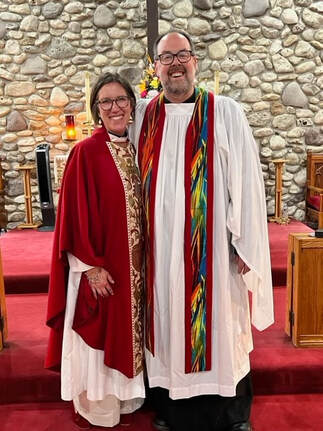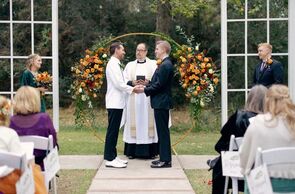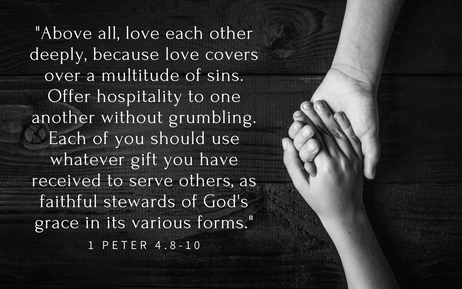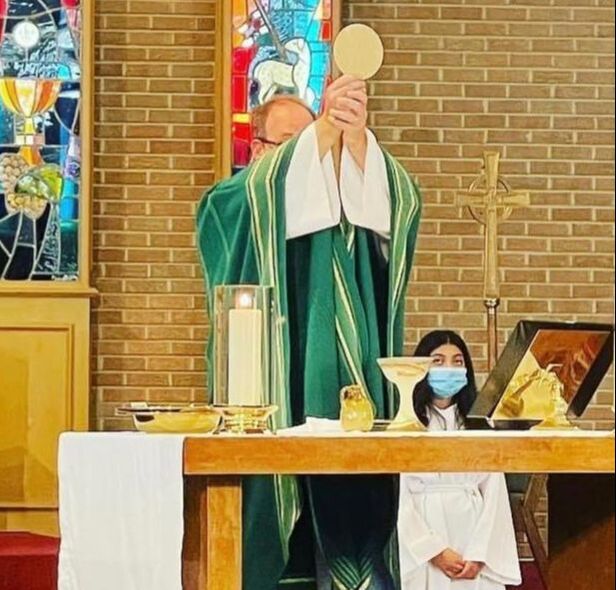 (Guest post by Tami Painter) A number of you have connected with me to emphasize your appreciation for all that Scott has done for Grace. You will not get an argument from me that Scott Painter is an amazing human being! His creativity, energy and dedication makes life bigger somehow. Scott’s ability to cast a vision and lead through the 100 steps to get there is impressive. He brings a lot of love and heart to all he undertakes. AND, there is a much broader story of Grace that God has been weaving for 60+ years. It’s a story of God’s endless provision and a community that continues to expand the definition of love and grace. This is what first drew me to Grace. In the interview dinner Scott and I had with the Bishop’s Committee, I heard story after story about times of great uncertainty and doubt when God showed up in the form of clergy, people with giftings perfect for the moment, and checks for exact amounts to meet the need. Every time the question was asked “Will Grace go on?” God said “Yes!” I have seen this first hand over the past 5 years. There have been truly amazing moments of provisions – ministers, musicians, new members, grants, gifts of service, gifts of craftmanship . . . So many people have stepped up to honor and endorse this uniquely diverse and loving place called Grace. Yet, change is hard. As part of this process, we will be separating from those we love including our young adult son who will be staying in Houston. I’m feeling sadness for this and will greatly miss our regular connections while also holding confidence all are ready and capable to stand strong. As Scott and I have done the work of pulling back and letting go, I have looked to God many times and asked “You got this?” The answer is as it has always been – an emphatic and resounding “Yes!” May the Holy Spirit continue to move powerfully among you as the story of Grace goes on. Much love, Tami
0 Comments
 These past few weeks have been filled with much personal reflection on my five years serving the good people of Grace in Houston. I have also pondered considerably on my calling into this wild and unpredictable life as a priest in Christ’s Church. Now entering my final week of ministry at Grace, I want to share some thoughts on the remarkable road to renewal and growth we have traveled together. Since the first time I was ever asked the “why” about God calling me to the particular vocation of priest (almost 14 years ago now), I have been able to sum it up in one word: reconciliation. The letter of First Corinthians contains words that have guided me for much of my life and ministry: “So if anyone is in Christ, there is a new creation: everything old has passed away; see, everything has become new! All this is from God, who reconciled us to himself through Christ, and has given us the ministry of reconciliation…” (First Corinthians 5:17-18, NRSV). I love that this beautiful thing God has done--resurrection, new life, new creation--is the grounding of the ministry God has called all Christians to engage. Since God has made all things new and has overcome the sin that isolates and divides us, the work now belongs to us: bringing people to God and together. This ministry of reconciliation, given to all Christians, has been the foundation of everything Grace has become in the past few years.
Together, we have embraced and enacted this ministry of reconciliation that God began in new creation and calls us to continue in our own renewed life. As a result, people across many spectra of diversity – politics and race and generation and sexual orientation and gender identity and physical abilities and religion – know Grace as a safe place, a loving people, and a spiritual home. Thank you, friends, for accepting this ministry of reconciliation with me. Thank you for living out the witness of new creation in Jesus Christ. Thank you for becoming the loving, embracing, inclusive, and faithful people you are. With gratitude and affection, Scott+ Almsgiving has been an important practice in the Christian faith, even though the word is not one often used today. More often, we will talk about “charity” or “outreach” or “service”. While those words certainly describe the Christian value of “loving neighbor as oneself,” enacted in our good works toward neighbor.
However, those terms do not get quite to the heart of the traditional concept of giving alms, passed down from the teachings of Jesus Christ, and rooted in the earliest expressions of the Christian religion. The concept of almsgiving is a particularly selfless kind of giving, a merciful generosity, an act of pity. Almsgiving is done in private, with no promise of even an indirect reward like the admiration or esteem of others. At the beginning of the season of Lent, on Ash Wednesday, Christians read the words of Jesus, when he called his followers to practice good works hidden out of sight. “Beware of practicing your piety before others in order to be seen by them; for then you have no reward from your Father in heaven. ‘So whenever you give alms, do not sound a trumpet before you, as the hypocrites do in the synagogues and in the streets, so that they may be praised by others. Truly I tell you, they have received their reward. But when you give alms, do not let your left hand know what your right hand is doing, so that your alms may be done in secret; and your Father who sees in secret will reward you.” (Matthew 6.1-6) Almsgiving is an act of generosity and kindness to be seen only by God. God gives the only reward, or the only repayment of the debt. One of the great church fathers, Basil the Great, of the 4th century, taught of the nature of alms like this: “If you help a poor person in the name of the Lord, you are making a gift and at the same time granting a loan. You are making a gift because you have no expectation of being reimbursed by that poor person. You are granting a loan because the Lord will settle the account. It is not much that the Lord receives by means of the poor, but He will pay a great deal on their behalf. And then quoting from the book of Proverbs: 'They who are kind to the poor lend to the Lord' [Prov. 19:17]" Mother Theresa used to speak of the poor as “Christ in his distressing disguise.” Jesus himself makes reference to this when he says: “I was naked and you clothed me, I was sick and you visited me, I was in prison and you came to me.’” (Matthew 25:36 RSV) To lend compassion to the naked, the sick, and the imprisoned is to love and have mercy upon our neighbor in an incarnate way – in the flesh – especially to those who most distress us. Almsgiving expresses the conversion of heart toward our neighbor, while fasting expresses a conversion in relationship with self, and prayer a turning to God. Christians are challenged, particularly in the season of Lent, to be converted, let by God into purer relationship with self, with God, and with Others. In turning toward others, the practice of giving alms forms us as people of love. I close with these words, also from Basil the great: “The bread in your cupboard belongs to the hungry man; the coat hanging unused in your closet belongs to the man who needs it; the shoes rotting in your closet belong to the man who has no shoes; the money which you put in the bank belongs to the poor. You do wrong to everyone you could help, but fail to help.”  “I invite you, therefore, in the name of the Church, to the observance of a holy Lent…” (Book of Common Prayer) The Season of Lent is a time of fasting and turning toward God, beginning on Ash Wednesday, and winding through 40 days (not counting Sundays) before the celebration of Easter. Lent, dating back to the first half of the 4th century, is among the earliest observances by the Church. (For comparison, Christmas took until well into the 7th century before it was widely celebrated.) Lent, which means springtime, was originally a season of preparation for new converts to Christianity. During this time, those known as catechumens were instructed in the faith and encouraged to commit themselves to fasting and prayer to ready their hearts for Baptism at the Great Vigil of Easter. Over the centuries Lent has taken on a wider application, inviting those already baptized and committed to Christian identity to turn again into faith with a time of fasting, prayer, and repentance. At Easter, we recall and reaffirm our baptismal vows with those newly joining the household of God. --- I have sojourned for many years with a conflicted attitude about Lent. At times, I’m ambivalent about it – understanding the season’s significance but missing its gifts; annoyed by the inconveniences of discipline, contrition, and penitence and blind to the possibilities of new hope and new life. In other years, I’ve outright dreaded Lent: sometimes from an outsized attachment to sin in my life and other times due to personal busy-ness, preoccupations, and stubborn resistance to being quiet and living simply. This year is different. I’m craving the simplicity, the discipline, and the course-correction that comes in this holy season. I need Lent this year like I can’t remember ever needing it. I desire to sit with my mortality, my moral entailments; and the places of brokenness in my life and in the world around me. I yearn to confess my weakness, my insufficiency, and my desperation. I need to do all of this, not for the sake of wallowing or sinking deeper into despair, but precisely because of a deep longing within me for Easter. I seek to become a person who can and will embrace resurrection with true openness, wide wonder, and new hope. On Ash Wednesday, the celebrant will invite us to observe a holy Lent with the words above. We are invited to live into this season of turning--from sin and evil in the world, toward hope, beauty, and new and abundant life. Scott+ The Rev. Scott Painter, Rector  Yesterday, January 21, 2023, The Rev. Carrie Hirdes was ordained a priest at St. Luke the Evangelist Episcopal Church in Houston’s Third Ward. I begin with that news, because Grace played a big part in Carrie’s formation when she was an Iona School for Formation intern with us in 2021. The Rector of St. Luke the Evangelist is The Rev. Marcia Sadberry, who herself was an Iona School intern at Grace in 2019. Last week, Jonathan Maresca was with us in worship as our preacher. Jonathan is currently Grace’s sponsored seminarian studying at Yale Divinity School for formation to the Priesthood. God willing, Jonathan’s ordination will take place in 2024. In November, Liam Barr was with us in worship as our preacher. In the summer of 2019, Liam was preparing for his final year of undergraduate studies at Davidson College in North Carolina. Thanks to a connection made by Bishop Monterroso, Liam accepted my invitation to serve as a summer intern at Grace, to be immersed in the life of this renewing parish as Liam engaged discernment for his future call. Now studying at Seminary of the Southwest in Austin, God willing Liam will be ordained in the Diocese of North Carolina in 2024. Fabian Berrios, our former Children’s Ministry intern (2018-2019), is married to Maria Bautista, who is currently studying for the priesthood at Virginia Theological Seminary. God willing, Maria will be ordained in 2024. I haven’t even mentioned Grace’s honor and privilege to have welcomed The Rev. Leah Wise as our Curate in July of 2022. Rev. Leah is with us for a two-year assignment to take first steps into ordained life as a new member of the clergy. She is here to learn and grow in her ministry, while simultaneously sharing her gifts with us so that we might continue to learn and grow as God’s people served by a second full time priest. (I should also mention the fact of Grace calling me in 2018. I was a new , very green priest who had never led a congregation before. You called me as your vicar, you have loved and supported me, and you have given me the grace to continue growing in my own ministry as we all grow together.) Nor until now have I mentioned the growing “chaplain corps” at Grace. While The Rev. Dawn gives generously of her time and talents to serve the Grace community, Dawn’s full time job is to work as a chaplain at the Harris County Psychiatric Center. Brian Rockhold and Thomas Borowski have recently completed full years, respectively, of Clinical Pastoral Education (CPE) in preparation to enter fully into the vocation of chaplain. Both Thomas and Brian are working currently as chaplains in the Texas Medical Center. Sara Bushell recently completed a first unit of CPE and is now engaged in her second of four units, also having now begun studies at Fuller Theological Seminary for a Master in Divinity degree. I hope all will recognize how absolutely remarkable it is for this not-as-little-as-we-used-to-be church to have such a significant role in raising up a new generation of leaders for the Church. Grace has continued to grow in health, strength and vitality. Fruit happens when the tree is healthy. Every single member of this congregation is an essential part of what God is doing in and through Grace. We enjoy the company of elder leaders and clergy, who minister and share their own hard-earned wisdom and insight with all of us. God is using Grace to bless the whole church and the world, and this is a part of our identity that we must all continue to embrace and cultivate as we move into God’s future for us. In 2022, we began to step into the new reality of being a full parish. Our first Vestry built community together, explored how leaders share responsibilities of care for the congregation, and started the work of visioning for the next season in Grace’s life. This year, we will continue that work and strategize for continued growth. Our Strategic Mission Grant for Music Outreach allowed us to bless dozens of local musicians throughout the year, facilitating performances, community concerts, and networking events according to the grant’s parameters. Our Hope for Mass, produced and directed by Paul English, drew over two hundred people for worship over two days in October. The music was inspiring, and the witness to hope made a lasting impact on all involved. The funding and programming made possible by the SGM grant will continue through the middle of 2024, with a possibility for renewal. In 2022, we made significant improvements to our worship space. The improvements enhance the beauty and the functional use of the space. I pray that in the year ahead, we will find new ways to faithfully steward the resource of our spaces for community building, worship, and outreach. We have said goodbye to so many loved ones in 2022. We miss our friends and family, with gratitude for all the love, laughter and care we shared with them in this world. There is a legacy of faithfulness and a heritage of ministry left by those who have gone on. All that Grace is today is built on the gifts of those who came before us. We must always remember this. I pray that we will continue to bless one another as we are blessed, and celebrate the gifts that each brings into our community. I pray that we will continue the holy work of breaking down every barrier that can keep us from God and from one another, reaching and embracing across diversity of race, culture, gender, generation, sexual orientation, ability, politics, and interests. Thanks be to God for the wonderful gifts of this community! Respectfully submitted, The Rev. Scott Painter, Rector  But Ruth said, ‘Do not press me to leave you or to turn back from following you! Where you go, I will go; where you lodge, I will lodge; your people shall be my people, and your God my God. Where you die, I will die— there will I be buried. May the Lord do thus and so to me, and more as well, if even death parts me from you!’ Ruth 1.16-17 --- The beautiful poetry we hear tonight conveys Ruth’s resolution, her steadfast devotion, to Naomi. “Where you go, I will go; where you lodge, I will lodge; your people shall be my people and your God my God.” As the story goes, this woman named Ruth had left her family of origin, her home country, the religious tradition of her childhood, to marry one of Naomi’s children. But that son, Ruth’s husband, has now died. And, so Naomi tries to get Ruth to go home. The old woman has nothing of value, nothing of a future, to offer her daughter-in-law now. But for some reason, Ruth won’t go away; she won’t leave Naomi. For anything in the past. We could wonder why… That oft-told interpretation says that Ruth’s staunch resolve is all about her true and fervent commitment to Naomi’s God. She’s had a religious conversion and will not return to the gods of her homeland. “No turning back, no turning back…” But there could be other explanations… Perhaps, Ruth knows that there is nothing waiting for her back there. We don’t know her experiences in that home country, what freedoms she gained in moving away from home; we do not know the expectations of her family and the demands that may await should she choose to return. It is also possible that Ruth has just found her own freedom and power in this moment, where the patriarchy literally has died off. No dudes around. (Not entirely relevant to our gathering here tonight, but I’m pretty sure many of us are ok with a bit less patriarchy in general!) And of course Ruth could also be staying for love: in this case, for love of Naomi. Maybe Ruth’s heart has been actually turned toward the old woman, turned into the sort of selfless, sacrificial, self-giving affection for another that brings a flood of meaning, connection and hope that we all long for in some way…. My preferred interpretation is an all-of-the above approach. Yes, to love of the God of Naomi, something compellingly meaning-making in Ruth’s conversion to a new way of knowing the Divine presence in her life... Yes, to not turning back. We grow, we move forward, and we break free of the constraints that try to keep us in the same places we were stuck for too long. (Why would we return to less than the life and light we’ve found along our life’s journey up to now?) YES, to the power to be one’s truest self, coming into new relationships as a whole person, bringing the completely-enough-you and the completely-enough-me into new relationships… And, YES for love. Yes, for finding it in giving of self and not just seeking out someone to make up for all the things I think I lack, all my perceived defiencies. You are good enough for this. And it can be as good as you dream it might. Brady and Colin: what you are doing here tonight, in the midst of friends and all kinds of family, is a bold and beautiful act of faith. This isn’t all new:
What you are today as you make these sacred promises to one another is not what you’ll be in a week or a month or in ten years. And so to make your vows here, now, is to grasp hands and to boldly forge ahead into a shared future, come what may. You have your person, and together the two of you will have a life, a home, an “us”. "Above all, clothe yourselves with love, which binds everything together. And let the peace of Christ rule in your hearts. And be thankful.” Amen.  In today’s era of global communication and a 24-hour-news cycle, difficult reports and horrific images from far away can easily overwhelm our senses before we even come to know about pain and loss in our own local communities and circles of relationship. I am often asked during times of global conflict, national violence, and extreme weather events: “What can we do?” My responses to those inquiries are often similar, across the spectrum of needs: pray, vote your conscience, give to reputed relief organizations, and-when appropriate-stand up and speak out in protest. Many times, the list of possible responses to tragedy becomes as generalized and desensitizing as does the steady barrage of bad news. But somehow through it all, my friends, we must stay soft and empathetic toward pain and sorrow. This is an essential part of our humanness, and an elemental part of what it means to engage in meaningful community. As I have reflected this week on the above words from 1 Peter, I’ve been drawn back to the focus on caring for those closest to us: loving each other deeply, offering hospitality to one another, using our unique gifts to serve others. It seems to me, that especially when the world feels like it’s going increasingly mad, it becomes even more important to stay alert and responsive to the physical presence of needs right in our own communities. This weekend, we will celebrate, memorialize, and commend to God’s keeping two members of the Grace family: Bob Keller and Lory Garrett. Both of these services will take place on this Saturday at 10 AM and 2 PM, respectively. I am already in awe at folks organizing and mobilizing to host two family receptions (one after each service), others stepping forward to serve in a marathon day of worship, and still more reaching out to the families with love and care in their grief. Additionally, I know that folks are praying and checking in on our siblings who are ill, and others who have lost loved ones in the last few days. This dynamic is not new or unusual for Grace; it is just more striking and pronounced with multiple events on the same weekend! I believe this work of caring for one another “as faithful stewards of God’s grace in its various forms” is the first answer to “what can we do,” whatever news may come from further afield. This is not ignoring the larger global challenges, but it is exercising our ability to feel compassion and to activate that compassion in our lives through works of love and mercy. Thank you for showing up this weekend for our loved ones in the Grace Family. Please keep doing this work of loving one another and taking care of each other so well. With affection, Scott+  June 5th is Pentecost Sunday. I love Pentecost, that feast day when the Church annually celebrates the coming of the Holy Spirit to the fledgling church (Acts 2), bridging divisions of language and culture to bring people together in the good news of Jesus Christ. A while back on Maundy Thursday we recalled Jesus’ new commandment to his followers: “Love each other.” (John 13:34) Here we are now, at the conclusion of the Great Fifty Days of Easter, lifting up our pentecostal prayer, “Come, Holy Spirit.” We pray the Spirit may continue to fall fresh on us, to inspire us to continue and grow in the love that Jesus showed us and calls us to share with one another. I can’t think of a more fitting local church family to celebrate Pentecost than Grace. The signs of the Holy Spirit’s work are everywhere in our parish. People from all over the world call Grace home. We are regularly inspired to be open to the change that comes from including more and more folks among us. We boldly try new things in order to step deeper into God’s future for us. And, most importantly, we keep growing in our love for one another: learning from our mistakes, making amends when we have offended someone, reaching to those unable to be present with us, and sticking together with little regard for our differences or disagreements. God is doing in us what God dreams for the whole world: building a community on the foundation of God’s eternal, unconditional and redemptive love shown by Jesus. I do not waver in my conviction that local churches built up as outposts of the Love of Jesus Christ in this world are the front lines of God’s work to save the world from all sin. The Holy Spirit—God’s very life flowing through us—is what makes it all possible. You know, Grace does church the hard way. Lots of local churches allow themselves to get divided off into “right and left” or “voted this way or voted that way” or “this kind of music or that kind of music” or “this color or that color” or “rich or poor” or a myriad other categories that can be used to slice and dice the Body of Christ to look more like the sin-sick world. We don’t do that. We stay together, with God’s help. We keep loving one another when someone says something we disagree with or that makes us uncomfortable, or maybe even says something that hurts us a little. We lean into our relationships with one another and allow loving Christian community to form us for living lovingly in the wide world. With God’s grace, we find loving ways to speak our truth to each other so that we can help one another grow. And we go out these red doors to love and serve the Lord, seeking and serving Christ in all persons, loving our neighbors as ourselves. Is this pollyannish? Yes. It’s too good to be true, too good to last, and too far fetched to build a church on. EXCEPT: the promise of Pentecost is that God comes and does among us what we cannot imagine or create or sustain for ourselves. If God dreams it—and God does—then God will make it happen in and through us. THIS is the miracle of Pentecost! GRACE is a miracle of Pentecost. When the Holy Spirit is at work among us, we are bound together in mutual affection, sticking together through thick and thin. The Spirit helps us stay together in spite of all the worldly forces trying to pull people apart. I look forward to celebrating this miracle with you on Pentecost Sunday. And in the season after Pentecost, I can’t wait to see how God continues to build us into a people of Love’s way, for the sake of the world. In peace, Scott+  As a pianist, I play music almost only by ear. (I can read notes, but have an impossible time translating the information to my fingers!) And I love playing improvisationally more than playing anything already written down or recorded somewhere else. Through this approach to music-making, I've found a unique relationship with the word "yes," because there is great creative energy in listening closely, feeling deeply, and playing courageously (even when not knowing exactly where it all will go). As I look back over the last four years of our life together as priest and people, I see that we have learned some of these same lessons again on the road we've traveled. (cont. p. 3) The Rev. Sam Wells, a theologian, writer, and priest in the Church of England, has said a great deal about the role of improvisation, primarily in theater, relating to theology, ethics and church. Wells says, “The heart of improvisation is the ability to keep the story going. Accepting refers to any response that accepts the premise of another actor’s “offer” — whether that offer be physical or verbal. Actors have to learn to say “yes” even when to do so seems impossible, improper, or dangerous” (Originally a sermon preached by Wells on Oct. 1, 2006, in Duke University Chapel). Together with God and one another, we have kept the story of Grace going by saying “yes” a LOT of times. We’ve tried many new things, and we’ve become a safer place to try even more into the future. We’ve learned that some experiments stick for a long time, some for a short time, and some fall flat. We’ve said yes, even when the offer might not be exactly what we imagine or think we want. We’ve said yes to welcoming online worshipers, even though it feels different than community used to. We’ve said yes to new music and musicians, even though we miss old friends and the informality of our pre-pandemic music team. We’ve said yes to new chairs, even though they might not be as comfortable as we wish or the color we like or as traditional as we prefer. And, we’ve said yes to new groups using our inside and outside spaces, even though it can be inconvenient and unsettling to share. Each of these “yesses” – and so many more – have brought us new opportunities and gifts, even as they also represent change and loss of what used to be. I love the idea of “accepting” whatever comes to us as an opportunity or an “offer.” I love the idea of working together to become people who say yes as much as possible, because “yes” can lead us to more growth, joy, and anticipation for what may come next. I know our culture of accepting offers is largely responsible for the growth and return to parish status we’ve recently celebrated as Grace. As we draw near to the season of Easter, we are reminded that an extreme example of acceptance—our Lord Jesus accepting suffering and death in solidarity with human sin and sickness—leads to the brilliant new possibility of abundant and everlasting life for all of creation. The glorious resurrection of Jesus makes a way for God’s yes to come to all of us – we are never turned away, never thwarted by the brokenness we know in ourselves and the world around us, never blocked from entering into the life for which we have been made and has now been made possible for everyone. I pray that as we move forward into Easter as the parish of Grace, God will increase our openness and generosity and our YES. In this, may we become people who are always open to opportunities and offers to serve God, one another, and our neighbors. It was Advent of 2017 when I first began discerning God’s call to serve as the next Vicar of Grace. There is no hint of hyperbole in me saying that I knew immediately I wanted to come and be in community with this congregation. The process of discernment had more to do with my asking the question of whether God’s will and my desire actually aligned. I am so grateful that I, and the people of Grace, and Bishop Doyle all agreed God was calling me to this people and place.
As I was talking with your Bishop’s Committee during that time of discernment, they shared with me many of the hard things that Grace had endured (and survived!) up to that point. There had been multiple financial hardships, loss of dedicated members, conflict, the departure of a beloved priest, a hurricane, and deferred maintenance on the building. In the retelling of it all, I noticed something in the voice and tone of those who spoke: a faithful resolve. There was, for sure, disappointment, discouragement, a worry for the future. But it was all seasoned with faith and resolution that God’s future included the continuing life and ministry of Grace Episcopal Church in Southwest Houston. Since 2010, this congregation has been a mission of the Diocese of Texas called “Grace.” Prior to that, it was a parish in the diocese called “St. George and St. Patrick Episcopal Church” (often known as “Two Saints”). Even further back to the late-1950’s, there were two congregations —one on W. Bellfort called St. George and another in Westbury called St. Patrick. When the decision was made to become Grace and a mission of the diocese, both actions signified a deeper commitment to doing whatever it would take to survive. As a mission, Grace had access to generous financial support from the Diocese of Texas. We also received a new vicar at that time, The Rev. Gena Davis, who led us through some difficult decision-making and the hard work of laying a foundation for renewal and growth. Of course, we also lost some of the autonomy and power for self-determination that a parish enjoys. As a mission, we have been directly under the supervision of the Bishop and at times have been reminded of the limits of that status — our representation at Diocesan Council has been 1 delegate instead of the 4 a parish gets; our congregational leaders are elected only with the Bishop’s approval, and our future is more immanently in the hands of the Bishop than is the case for a parish. These eleven years a mission have given us the breathing room to get many aspects of our life and ministry back on a sustainable path. Our congregation is growing with new members and new vision; our finances have stabilized, our building and campus have been improved with major issues of deferred maintenance addressed, our staff has solidified as a team, and our people are inspired with hope for service. Now we are celebrating one of our most successful pledge campaigns in recent history. We exceeded our 2022 pledge goal on DECEMBER 1 ! More than 20 increased pledges and 6 new pledges show that we are growing both in commitment and new members of our community. I want to thank Doward Hudlow for his energizing and able leadership of the campaign this year, along with all those on the Stewardship Committee. And—thank YOU for giving! Now is the time for Grace to become a parish. The Bishop has approved our request to go for a vote before Diocesan Council on February 26, 2022. If/when it passes, we will immediately be seated as a parish for the remainder of business at Council. In January, we will provisionally elect a vestry at our annual meeting that will go into office upon our return to parish status. And, your priest in charge will be called a “rector” instead of a “vicar.” Many of these changes may feel like window dressing, but I assure you they signify a big step into a new season where we will all explore creative ways of sharing leadership, expanding capacity, growing ministry and moving forward together into God’s dreams for us. In the coming weeks, we will take time to reflect, celebrate, imagine and plan for future of the Parish of Grace. (Who wants to plan the PARTY?!) I am in awe of all that God is doing in and through us, and I am full of faith in the God who is calling us forward. As we move through Advent and into the Christmas and Epiphany seasons, let us be mindful that God can and does bring new life into desperate and desolate place. Our own existence as the Parish of Grace will be a sign of this. Affectionately, Scott+ |
The Reverend
|
Contact Us |
WorshipSundays:
Rite II Eucharist (English), 10 am La Misa (Español), 12 pm |
|
Grace Episcopal Church is in the Episcopal Diocese of Texas, a member of the worldwide Anglican Communion.



 RSS Feed
RSS Feed